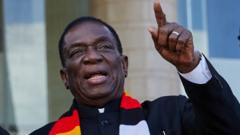Prime Minister Benjamin Netanyahu's coalition has passed legislation allowing more political influence in judiciary selections, a move critics warn could politicize the courts and rekindle mass protests.
Netanyahu Resumes Controversial Judicial Reforms Amid Ongoing Conflict

Netanyahu Resumes Controversial Judicial Reforms Amid Ongoing Conflict
Israeli lawmakers grant themselves enhanced authority over judicial appointments, reigniting a contentious debate that emerged prior to the war with Hamas.
Prime Minister Benjamin Netanyahu’s coalition enacted legislation on Thursday morning that has given politicians increased control over the selection of judges, rekindling a contentious effort to reform the Israeli judiciary that had sparked national division prior to the war with Hamas. The Knesset, Israel's 120-seat Parliament, approved two laws after an extensive debate that took place overnight, with the opposition largely boycotting the voting process. These laws overhaul the committee responsible for appointing judges, including Supreme Court justices, leading critics to argue that this will undermine judicial independence and politicize the judiciary.
The new legislation represents a continuation of Netanyahu’s two-year campaign to amplify his coalition’s power over other branches of government. Following the Hamas-led attack in October 2023, which triggered the current conflict in Gaza, Netanyahu had previously paused similar reform efforts to maintain national unity during wartime. However, he has now returned to this initiative alongside attempts to diminish the powers of various state oversight agencies, including moves to dismiss both the attorney general and the head of the domestic intelligence service.
The laws enacted on Thursday were less aggressive than earlier proposals but still posed the risk of provoking widespread discontent reminiscent of pre-war protests. Demonstrators gathered outside the Knesset in Jerusalem ahead of the vote, displaying Israeli flags while some echoed calls for the government to negotiate with Hamas for the release of hostages held in Gaza. Inside the Parliament, Netanyahu delivered a passionate speech asserting that his administration's reforms would rectify what he termed an unelected “deep state,” drawing parallels to rhetoric popularized by former U.S. President Donald Trump.




















